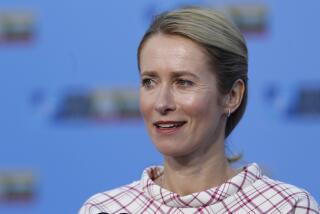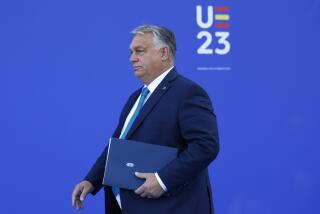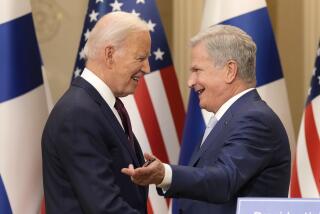Bush Regrets Treaty That Split Europe
- Share via
RIGA, Latvia — As he prepared to celebrate the 60th anniversary of the Nazi defeat in World War II, President Bush said Saturday that the United States sacrificed the freedom of small nations during the postwar period in its eagerness to bring stability to Europe.
U.S. choices at the time contributed to the rise of the Soviet empire, Bush said, which led to “one of the greatest wrongs in history.”
Bush, visiting the capital of a Baltic state that suffered under Soviet rule, criticized the 1945 Yalta treaty signed by President Franklin D. Roosevelt, Soviet leader Josef Stalin and British Prime Minister Winston Churchill. Bush said the pact, which defined zones of control among the wartime allies, followed in the “unjust tradition” of an earlier deal between Stalin and Hitler. In the process, the Yalta accord opened the door to the Soviet occupation of Eastern and Central Europe.
“Once again, when powerful governments negotiated, the freedom of small nations was somehow expendable,” said Bush, addressing an audience that included the presidents of Latvia, Lithuania and Estonia, with whom he had met earlier in the day.
“Yet this attempt to sacrifice freedom for the sake of stability left a continent divided and unstable,” he said. “The captivity of millions in Central and Eastern Europe will be remembered as one of the greatest wrongs of history.”
Bush’s speech in effect served as an argument for his ambitious second-term overseas agenda: promoting democracy and ending tyranny on a global scale. His efforts have been criticized by some politicians and commentators abroad, who accuse him of meddling and oppose the centerpiece of his strategy, the invasion of Iraq.
Using language that recalled his sweeping Jan. 20 inaugural address that outlined the new doctrine, Bush sought to link the defeat of the Nazis and the eventual end of the Cold War to his current goals of reshaping the Middle East and the countries of the former Soviet Union.
“From the vantage point of this new century, we recognize the end of the Cold War as part of an even broader movement in our world. From Germany and Japan after World War II, to Latin America, to Asia, and Central and Eastern Europe, and now to the broader Middle East, the advance of freedom is the great story of our age,” he said.
The history of the postwar period held lessons, Bush said, including that “skeptics and pessimists are often wrong, because men and women in every culture, when given the chance, will choose liberty.”
Among those critical of Bush’s agenda is Russian President Vladimir V. Putin, who will play host to the U.S. leader for a summit and social dinner tonight in Moscow on the eve of Monday’s celebration in Red Square marking the Nazi defeat.
Putin was angered by Bush’s decision to bookend his Moscow trip with Saturday’s visit to Latvia and a speech planned for Tuesday in Tbilisi, Georgia, the site of the democratic Rose Revolution of 2003. Putin’s government has expressed concern that U.S. involvement in the region could lead to Russia’s encirclement.
Putin’s frustration boiled over in an interview on CBS’ “60 Minutes,” set to air tonight, in which he pointed to the contested election of 2000 to challenge Bush’s credibility on democracy. Putin first hinted at that idea during an awkward February news conference with Bush in which he noted that U.S. presidents are elected by the Electoral College, not by direct vote of the people. Bush lost the popular vote to Al Gore in the election.
“Four years ago, your presidential election was decided by the court. The judicial system was brought into it,” Putin told CBS’ Mike Wallace. “But we’re not going to poke our noses into your democratic system because that’s up to the American people.”
Still, Bush on Saturday listed a variety of hotspots along Russia’s borders that interest the U.S., such as Belarus, Moldova, Ukraine and Georgia. He offered gentle criticism of Putin’s point of view.
“The United States has free and peaceful nations to the north and south of us,” Bush said. “We do not consider ourselves to be encircled. We consider ourselves to be blessed.
“No good purpose is served by stirring up fears and exploiting old rivalries in this region,” Bush said. “The interests of Russia and all nations are served by the growth of freedom that leads to prosperity and peace.”
Although Bush and Putin have enjoyed a cordial, even friendly, relationship since they met in 2001, tensions have been on the rise since the Russian president began centralizing authority in the Kremlin.
Bush said Saturday that he agreed that Russia “will follow its own course, according to its own history.” But, he said, “all free and successful countries have some common characteristics: freedom of worship, freedom of the press, economic liberty, the rule of law and the limitation of power through checks and balances.
“In the long run, it is the strength of Russian democracy that will determine the greatness of Russia,” Bush said. “And I believe the Russian people value their freedom, and will settle for nothing less.”
Adding to the tension was a letter Bush wrote recently to Latvia’s leader expressing sympathy for the suffering of the Baltic states under Soviet rule.
The Baltic leaders have demanded that Putin denounce the history of Soviet oppression and the 1939 pact between Germany and the Soviet Union that allowed for the division of Eastern Europe between them. Putin has suggested that the Baltic countries invited the Soviets in and has said that a 1989 Soviet statement renouncing the pact sufficed as an apology.
The Lithuanian and Estonian leaders are boycotting Monday’s events in Moscow. Latvian President Vaira Vike-Freiberga plans to attend, but she has been blunt in calling the Soviet annexation akin to slavery and accusing Putin of lying about history.
The Soviet invasion “brought an alien regime into our country,” Latvian Foreign Minister Artis Pabriks said in an interview.
“So on top of this, we have to now go and celebrate a victory over Nazism in the capital of the regime that had been oppressing us for 50 years, in the capital which is called Red Square,” Pabriks said. “You can understand there is a psychological feeling, especially that the same government sitting in this Red Square is saying, ‘Sorry guys, you were guilty yourself. You were not occupied, you joined.’ ”
For Bush, the controversy requires straddling two interpretations of history: embracing the Baltic leaders’ denunciation of Soviet behavior while joining a celebration that will extol the Soviets’ central role in vanquishing the Nazis.
On Saturday, he suggested that the Baltic leaders move on.
“My hope is that we’re now able to move beyond that phase of history into a phase that is embracing democracy and free societies,” he told reporters. “These are extraordinary times that we’re living in, and the three Baltic countries are capable of helping Russia and other countries in this part of the world see the benefits of what it means to live in a free society.”
More to Read
Sign up for Essential California
The most important California stories and recommendations in your inbox every morning.
You may occasionally receive promotional content from the Los Angeles Times.










